
AI can be Remarkable.
Where Canada’s AI future comes to life.
Experience what makes AI truly Remarkable at Vector Institute’s signature annual conference – the defining event that demonstrates why Canada leads in artificial intelligence. At Remarkable, we unite world-renowned researchers, industry visionaries, and future-forward talent through thought-provoking sessions that bridge the gap between groundbreaking discoveries and transformative applications.
This isn’t just another AI conference. It’s where Canada’s concentrated AI ecosystem showcases its unique advantage: the proximity of pioneering research institutions, innovative enterprises, and forward-thinking government partners working together to accelerate AI’s positive impact.
Since launching in 2024, Remarkable has rapidly established itself as the defining event that showcases why Canada leads in artificial intelligence. Across two groundbreaking conferences, we’ve demonstrated the power of our concentrated AI ecosystem – where world-renowned researchers, innovative enterprises, and forward-thinking government partners work together to accelerate AI’s positive impact.

3500+
global attendees to date*
1700+ Remarkable 2024 attendees
2000+ Remarkable 2025 attendees

40+
countries represented to date

30
thought-leading speakers to date

“Canada has everything necessary to lead in AI. We need to be more ambitious, and find ways of working together so we’re not just replicating each other.”
Deval Pandya
Vice President, AI Engineering, Vector Institute
Where research excellence meets industry innovation
As a central hub connecting academia, industry, and public institutions, Remarkable 2025 demonstrated how physical proximity and close collaboration create unique advantages for innovation and implementation. While speakers acknowledged Canada’s current adoption challenges, they emphasized the country’s strong foundation and readiness for leadership in AI, pointing to Vector’s successful industry partnerships and breakthrough research achievements.
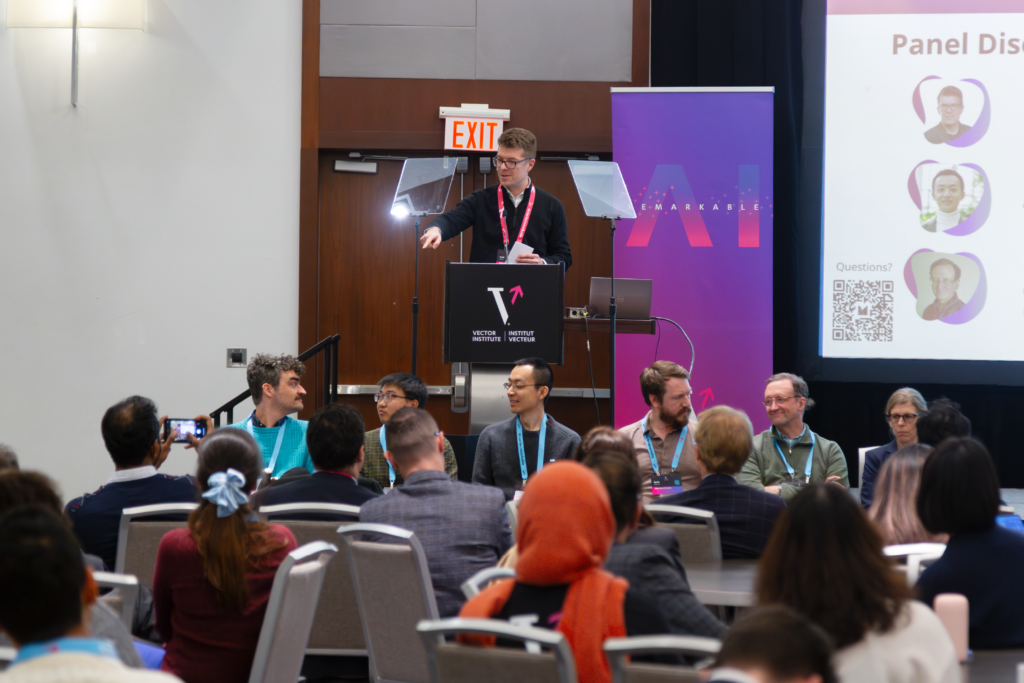
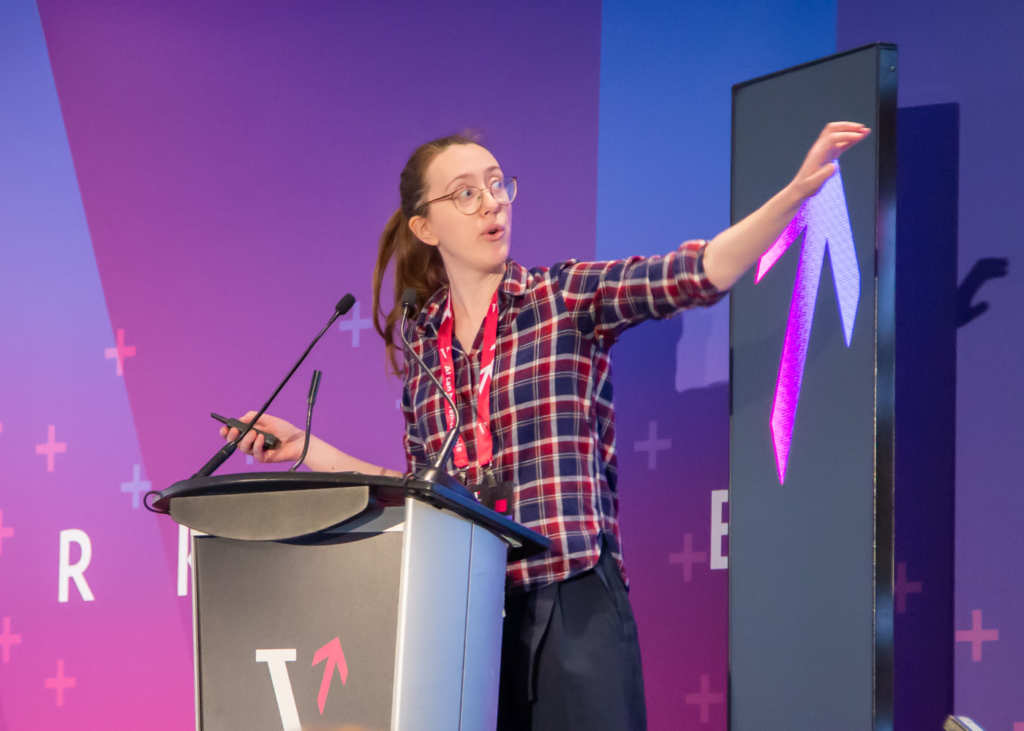
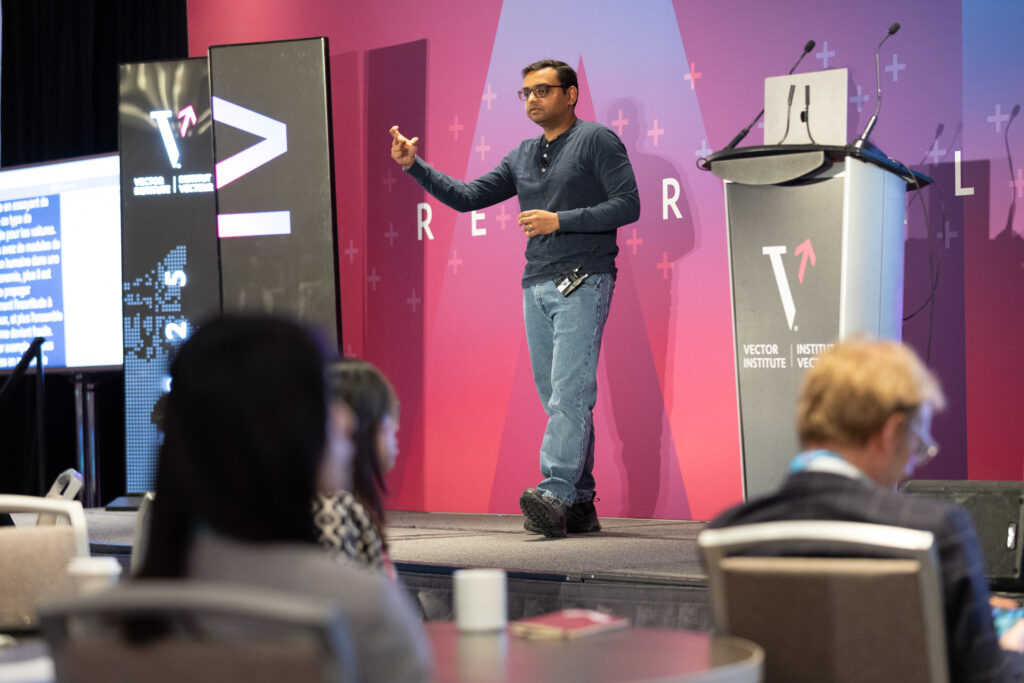
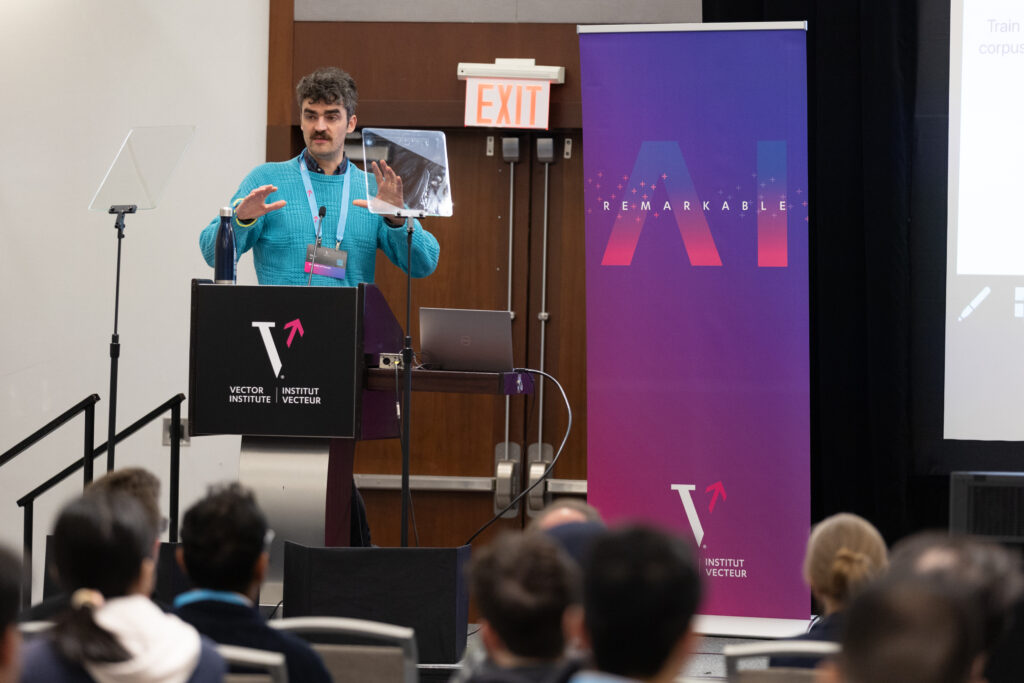
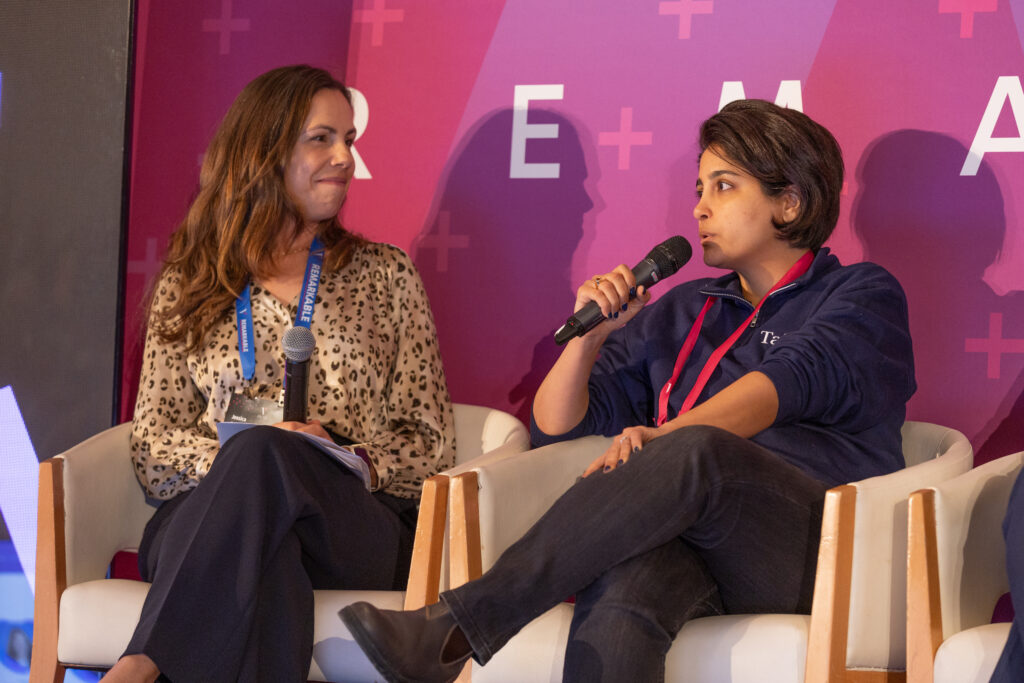
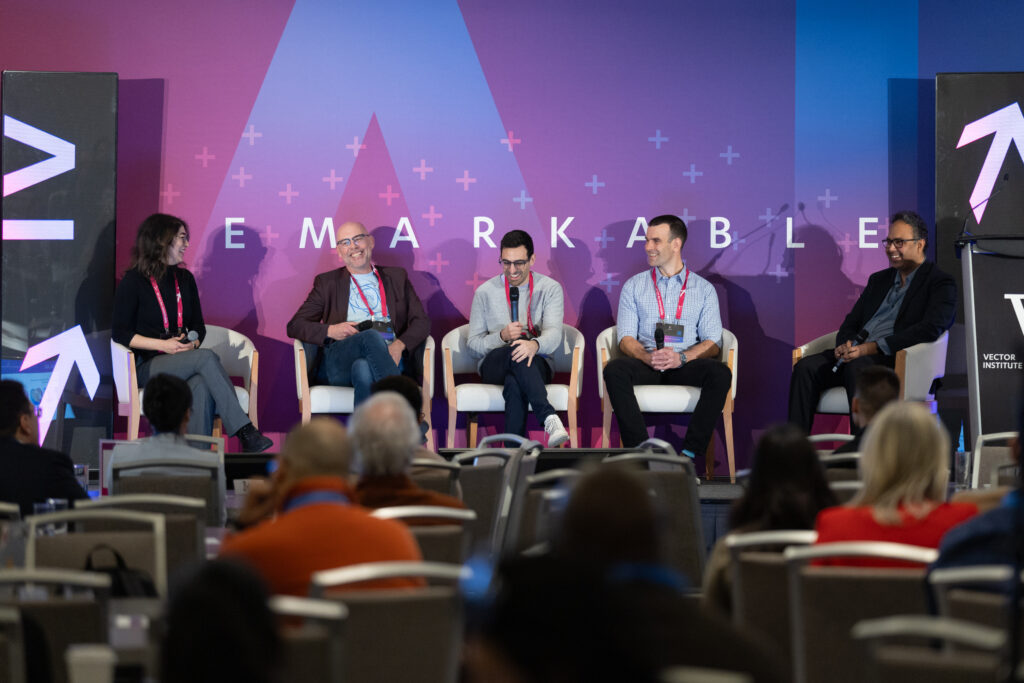
Research at the frontier of AI innovation
Canada’s research institutions drive global AI advancement, and Remarkable showcases this leadership through world-class academic presentations and breakthrough research reveals.

Geoffrey Hinton: Will Digital Intelligence Replace Biological Intelligence? (Remarkable 2024)
Vector’s Chief Scientific Adviser and 2024 Nobel Prize winner used his Remarkable 2024 keynote to explore profound philosophical questions about artificial intelligence and its potential to surpass human intelligence. Drawing from decades of pioneering research, Hinton shared his growing concerns about AI’s existential risks while examining fundamental questions about consciousness, understanding, and intelligence itself.
The critical challenge: Hinton encouraged AI researchers and students to accept the mission of designing AI that is “unerringly benevolent” – acknowledging both the tremendous potential and serious risks of advanced AI systems.
Watch this essential presentation on the future implications of artificial intelligence from one of its founding fathers.
Brendan Frey, Vector Faculty Member / Deep Genomics – BigRNA: A Foundation Model of RNA Biology That Unlocks Drug Discovery (Remarkable 2024)
At Remarkable 2024, Vector co-founder Brendan Frey introduced BigRNA, the world’s first foundation model for RNA biology. This revolutionary AI system can predict complex RNA mechanisms and accelerate therapeutic development, achieving remarkable accuracy in predicting the effects of genetic mutations and potential drug interventions.
The medical breakthrough: BigRNA demonstrates astonishing ability to predict how cellular machinery will behave under novel circumstances. Frey outlined plans to scale BigRNA 100-fold, setting the stage for developing new, life-saving therapeutics.
As a Fellow of the Royal Society of Canada and Vector co-founder, Frey embodies the intersection of world-class research and practical innovation that defines Canada’s AI ecosystem.
Experience the full presentation on how AI is transforming genomic medicine.
Nitish Srivastava, Vayu Robotics – Breaking the Data Barrier: Using Simulation to Train Autonomous Driving Robots (Remarkable 2025)
Dr. Srivastava’s groundbreaking Remarkable 2025 presentation demonstrated how innovative simulation techniques and advanced AI architectures are revolutionizing autonomous delivery robots. His work at Vayu Robotics shows how combining web-scale visual learning with simulation-based training enables robust real-world robot navigation, transforming the landscape of local commerce and delivery solutions.
Dr. Srivastava, CTO and co-founder of Vayu Robotics, completed his PhD at the University of Toronto under Geoffrey Hinton and Ruslan Salakhutdinov. Previously at Apple working on robotics projects from 2017-2022, he co-founded Clarevision Research, a perception company for autonomous vehicles that was later acquired by Apple – highlighting Canada’s continued leadership in training world-class AI talent.
Watch the full presentation to see how simulation-based training is democratizing autonomous robotics.
Kelsey Allen, Vector Faculty Member – Physical reasoning in natural and artificial intelligence (Remarkable 2025)
From broom-wielding problem-solving to groundbreaking AI systems, Dr. Allen’s Remarkable 2025 keynote explored the fascinating intersection of human and machine physical reasoning. This compelling talk dives into how both natural and artificial intelligence understand and manipulate the physical world, showcasing cutting-edge research in graph neural networks and their applications in real-world physics simulations.
Dr. Allen is an Assistant Professor of Psychology and Computer Science at UBC and a faculty member at the Vector Institute. Previously a Senior Research Scientist at Google DeepMind for four years in San Francisco and London, her award-winning work includes the International Glushko Prize for Best Dissertation in Cognitive Science (2022) and Best Paper Award from Robotics: Science and Systems (2018), focusing on adaptive and efficient learning in physical problem-solving domains.
Watch her compelling presentation on the future of human-AI collaboration in physical problem-solving.
From lab breakthroughs to market impact
Canadian industry leaders leverage cutting-edge research to transform businesses across sectors. This is where theoretical AI becomes measurable business impact.
Health care AI: Building trust through proven results
Remarkable conferences consistently showcase how Canadian health care leaders are implementing AI systems that save lives and improve patient outcomes. The 2024 health care panel featured leaders who demonstrated real-world implementations transforming patient care.
Dr. Muhammad Mamdani (Unity Health) shared how AI improves patient prognosis and streamlines CT scan workflows, while Mike Hamilton (GE Healthcare Canada) explored imaging innovations making diagnostics faster and more accurate. Dr. Anna Goldenberg (SickKids) revealed pioneering work in preventative care, showing how AI transforms healthcare from reactive to preventative approaches.
Industry insight: “Everyone needs to know enough to ask the right questions,” said Beena Ammanath, Executive Director of the Global Deloitte AI Institute, during her Remarkable 2024 presentation on moving the tech industry beyond accepting “unintended consequences” to embracing proactive responsibility in AI development.
Watch the health care AI panel to see how Canadian organizations are leading in trustworthy medical AI implementation.
Decoding Canada’s AI skills blueprint: What industry really needs
Remarkable 2025’s panel brought together leading industry experts to explore the critical skills gap in AI adoption and what Canadian organizations need to thrive in an AI-driven economy. Lewis Curley (KPMG), Stephanie Maccio (Bell), Ezequiel Machabanski (EllisDon), and Ozge Yeloglu (CIBC) revealed how companies across banking, telecommunications, construction, and consulting are evolving their talent strategies and building teams for AI transformation.
Watch the skills panels to understand what capabilities Canadian organizations actually need for AI transformation.
Cross-industry AI implementation challenges: Overcoming the adoption gap
Remarkable 2025 revealed striking industry realities: 73% of Canadian businesses have not yet considered using generative AI, highlighting both the challenge and the massive opportunity ahead. Industry leaders from major organizations including Google, RBC, and Unilever shared practical insights on overcoming implementation challenges.
Enterprise transformation stories:
- Google representatives shared strategies for helping Canadian businesses navigate AI integration
- RBC leaders demonstrated how financial institutions can responsibly scale AI across operations
- Unilever experts explored consumer goods applications and supply chain AI implementations
The implementation reality: While the statistics show significant adoption gaps, Canadian enterprises that are implementing AI demonstrate the practical pathways for others to follow, particularly when leveraging Canada’s concentrated AI ecosystem for guidance and partnership.
Getting Hired in AI: Spotlight on Early Careers
Remarkable 2024’s dynamic panel discussion featured four early-career AI leaders sharing invaluable insights on breaking into the AI industry. Nicole Lee (Senior Manager, AI at Bell Canada), Emily Napier (Data Scientist at Beatdapp), Wafiq Syed (Analytical Lead at Google), and Santoshi Tadanki (Leadership Development Associate at RBC) offered practical strategies for standing out in today’s competitive job market, from crafting authentic job applications to leveraging networking effectively, with special emphasis on the impact of generative AI on hiring practices and career development.
Watch the skills panels to understand what capabilities Canadian organizations actually need for AI transformation.



“One of the greatest risks is not doing anything at all.”
Dr. Laura Gilbert
Head of AI for Government at Ellison Institute of Technology
Building toward Remarkable 2026: The momentum continues
The success of our first two conferences has established Remarkable as the premier gathering for Canada’s AI community. As we look toward 2026, the momentum is building for what promises to be our most impactful conference yet.
Stay tuned for more:
- World-class research presentations from global pioneers and emerging talents sharing the latest AI discoveries
- Industry transformation showcases demonstrating how cutting-edge research transforms business outcomes
- Strategic networking opportunities connecting the full spectrum of Canada’s AI ecosystem
- Talent development focus empowering the next generation of AI leaders
Details on Remarkable 2026 will be announced soon.
Continue the Remarkable journey
Get monthly insights from Vector, including Remarkable event recaps, groundbreaking research, and AI innovation. Register for Vector’s monthly newsletter
